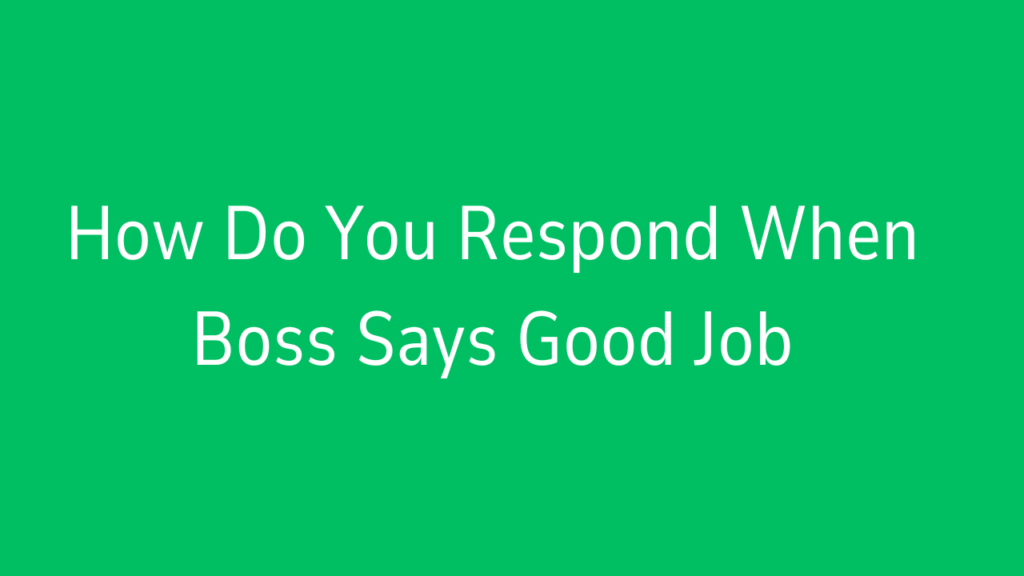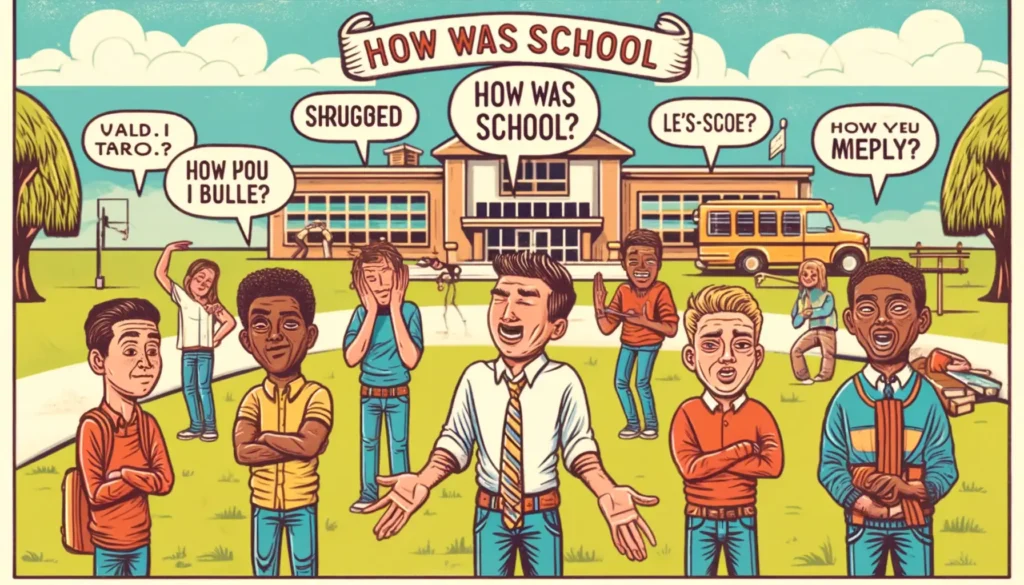Receiving positive feedback from your boss, especially when they say “Good job,” is always a great feeling. It can boost your confidence, reinforce your dedication, and motivate you to perform even better. However, the way you respond to this compliment can be just as important as the work that earned it. Whether you’re a new employee or a seasoned professional, knowing how to respond appropriately to praise is key to maintaining positive relationships at work and continuing to build your professional reputation.
In this blog post, we’ll explore various ways to respond when your boss says “Good job.” We’ll cover different scenarios, discuss why the response matters, and offer practical tips to make your reply stand out while keeping things professional.
Why Does Your Boss Say “Good Job”?
Before delving into how to respond, it’s important to understand the context behind the compliment. When your boss says “Good job,” it generally indicates one of the following:
1. Acknowledging Quality Work
Your boss might be recognizing the quality of your work. This could include a project you’ve completed, a presentation you delivered, or a task you’ve excelled at.
2. Acknowledging Effort
Sometimes, your boss may praise the effort you’ve put into a task, even if the outcome wasn’t perfect. This shows recognition for your dedication and hard work.
3. Encouraging Consistency
When your boss consistently says “Good job,” it could be a way of motivating you to keep up the good work and to ensure that your performance remains at a high level.
4. Building Morale
A compliment like “Good job” is often given to boost your morale and show appreciation. It’s a way to let you know that your efforts are noticed and valued.
5. Reinforcing Positive Behavior
Your boss may use this phrase to reinforce the positive behaviors and attitudes that align with the company’s values. It can be a sign that you’re moving in the right direction as an employee.
How to Respond When Your Boss Says “Good Job”
Your response to your boss’s praise can make a big difference. A thoughtful, sincere reply not only shows gratitude but also helps build a positive rapport with your manager. Here are several ways to respond, depending on the situation:
1. Simple and Grateful Response
A simple, polite response is always appropriate and appreciated. This type of response shows that you’re grateful for the recognition without overdoing it.
- Example Response 1: “Thank you! I appreciate the feedback.”
- Example Response 2: “Thanks! I’m glad I could help.”
- Example Response 3: “I really appreciate it. I’ll keep working hard.”
- Example Response 4: “Thank you! It’s great to know my efforts are being noticed.”
- Example Response 5: “Thanks for the kind words. I’m happy to contribute.”
Why this works:
- Shows appreciation: You acknowledge the praise while maintaining humility.
- Maintains professionalism: A simple thank you is always polite and appropriate for any workplace.
2. Acknowledge the Team or Support
If your work was a team effort, it’s nice to acknowledge that. This demonstrates your ability to work collaboratively and shows appreciation for your colleagues.
- Example Response 1: “Thank you! I couldn’t have done it without the support of the team.”
- Example Response 2: “I really appreciate that! The team was a big part of this success.”
- Example Response 3: “Thanks! It was a great team effort, and I’m glad it worked out well.”
- Example Response 4: “Thank you! Everyone’s input really helped make this happen.”
- Example Response 5: “I’m happy to be part of such a great team. Thanks for the recognition.”
Why this works:
- Team-oriented: It reflects good teamwork and shows you value collaboration.
- Building goodwill: Acknowledging others can create a positive work environment and help strengthen your relationships with coworkers.
3. Offer to Do More
If you want to show initiative and your willingness to take on more responsibility, offer to help with further tasks or suggest improvements. This shows that you’re committed to the company’s success.
- Example Response 1: “Thank you! If there’s anything else I can help with, just let me know.”
- Example Response 2: “Thanks! I’m always looking for ways to contribute even more.”
- Example Response 3: “I appreciate the feedback! I’m happy to take on additional responsibilities if needed.”
- Example Response 4: “Thanks! Let me know if there’s anything else I can do to help.”
- Example Response 5: “I’m glad to hear that! If there’s another project I can help with, I’d love to pitch in.”
Why this works:
- Demonstrates initiative: Offering to help with more work shows that you’re eager to contribute.
- Shows ambition: This response signals to your boss that you’re interested in growing and taking on additional responsibilities.
4. Ask for Constructive Feedback
While “Good job” is a positive compliment, it may not provide enough specific information on areas of improvement. Asking for constructive feedback can help you continue to grow in your role and ensure you’re meeting or exceeding expectations.
- Example Response 1: “Thank you! If you have any specific feedback on how I can improve, I’d love to hear it.”
- Example Response 2: “Thanks! I’m always looking to improve. Any tips on what I could do better next time?”
- Example Response 3: “I really appreciate that. If there are any areas I can improve in, please let me know.”
- Example Response 4: “Thank you! Is there any aspect of the project where you think I could improve?”
- Example Response 5: “Thanks for the compliment! If you have suggestions for how I can make my work even better, I’m all ears.”
Why this works:
- Shows growth mindset: Asking for feedback demonstrates that you’re open to learning and self-improvement.
- Builds trust: It shows that you value your boss’s opinion and are committed to doing your best.
5. Respond with Humor (When Appropriate)
In some workplaces, adding humor to your response can lighten the mood and make the conversation more enjoyable. However, this response is best used when you have a friendly, open relationship with your boss and understand the work environment’s tone.
- Example Response 1: “Thanks! I’m pretty sure my secret is a cup of coffee and sheer determination!”
- Example Response 2: “Thanks! I’m glad I made it through without any coffee spills!”
- Example Response 3: “I appreciate that! Who knew all those late nights would pay off!”
- Example Response 4: “Thanks! Guess I’m on a roll today, I’ll try to keep it up!”
- Example Response 5: “Thanks, I guess all that hard work paid off — now, where’s the celebration?”
Why this works:
- Adds personality: Humor can make you appear more personable and help build a rapport with your boss.
- Relieves stress: It can create a lighter atmosphere and foster a positive working environment.
Tips for Responding to “Good Job” from Your Boss
- Be Sincere
- Always make sure your response feels authentic. If you’re not feeling particularly proud of your work, a simple “Thank you” will still work well.
- Use Appropriate Tone
- Choose a response that matches your relationship with your boss and the work culture of your office. Avoid being overly casual unless it’s common in your workplace.
- Avoid Over-Complimenting Yourself
- While it’s good to acknowledge your contribution, avoid excessive self-praise. Focus on the quality of your work and let your boss’s compliment stand on its own.
- Don’t Overthink It
- Keep it simple. You don’t have to come up with a long, elaborate response. A brief, polite answer is often all you need.
- Show Gratitude
- Whether you choose to acknowledge your team or offer to take on more work, always express gratitude for the recognition. This helps build a positive relationship with your boss.
Example Table: How to Respond to “Good Job”
| Situation | Response Option | Reason |
|---|---|---|
| Simple praise | “Thank you! I appreciate the recognition.” | Shows gratitude and humility. |
| Teamwork-related | “I couldn’t have done it without the team. Thanks!” | Acknowledges teamwork and humility. |
| Offers to take on more work | “Thanks! Let me know if I can assist with anything else.” | Shows initiative and commitment. |
| Asking for feedback | “I appreciate that! Any feedback on how I can improve?” | Shows a desire for improvement. |
| Humorous response | “Thanks! Maybe it was the coffee, who knows?” | Adds personality and lightens the mood. |
Conclusion
Responding to “Good job” from your boss is an opportunity to show gratitude, demonstrate professionalism, and maintain a positive working relationship. Whether you keep it simple, acknowledge your team, or offer to take on more, your response will reflect your character and work ethic. By considering the context, your relationship with your boss, and the work environment, you can tailor your reply to suit the situation and ensure that you leave a positive impression. Stay gracious, confident, and ready to continue your



